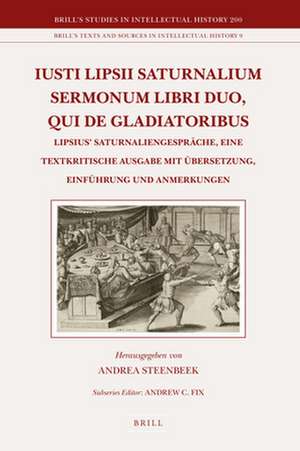Iusti Lipsii Saturnalium Sermonum libri duo, qui de gladiatoribus: Lipsius' Saturnaliengespräche, eine textkritische Ausgabe mit Übersetzung, Einführung und Anmerkungen: Brill's Studies in Intellectual History / Brill's Texts and Sources in Intellectual History, cartea 200/9
Editat de Andrea Steenbeekde Limba Germană Hardback – 10 aug 2011
In his Saturnalian dialogues (1582), Lipsius describes all aspects of gladiatorial combat, for example, that a great variety of people – criminals but also highly placed officials – took part in the combats, sometimes as volunteers. This detailed description fits into Lipsius’ other historiographical works, such as De Amphitheatro, published in 1584. After an elaborate exposition about gladiators, in the last chapter of the Saturnalian dialogues he gives an impassioned speech about their admirable constancy despite extremely hard circumstances. In several letters, Lipsius also refers to gladiators as proper models to be imitated. His main aim, here and elsewhere, was the promotion of his Stoic ethic – a goal that would ultimately prove successful: De Constantia, first published in 1584, has gone through a large number of reprints, editions and translations.
Din seria Brill's Studies in Intellectual History / Brill's Texts and Sources in Intellectual History
- 18%
 Preț: 682.11 lei
Preț: 682.11 lei - 18%
 Preț: 1082.92 lei
Preț: 1082.92 lei - 18%
 Preț: 726.56 lei
Preț: 726.56 lei - 18%
 Preț: 719.55 lei
Preț: 719.55 lei - 18%
 Preț: 719.42 lei
Preț: 719.42 lei - 18%
 Preț: 718.77 lei
Preț: 718.77 lei - 18%
 Preț: 682.23 lei
Preț: 682.23 lei - 18%
 Preț: 1012.41 lei
Preț: 1012.41 lei - 18%
 Preț: 692.11 lei
Preț: 692.11 lei - 18%
 Preț: 592.46 lei
Preț: 592.46 lei - 18%
 Preț: 996.79 lei
Preț: 996.79 lei - 18%
 Preț: 751.51 lei
Preț: 751.51 lei - 18%
 Preț: 714.37 lei
Preț: 714.37 lei - 5%
 Preț: 1050.86 lei
Preț: 1050.86 lei - 18%
 Preț: 1344.07 lei
Preț: 1344.07 lei - 18%
 Preț: 837.85 lei
Preț: 837.85 lei - 18%
 Preț: 1339.41 lei
Preț: 1339.41 lei - 18%
 Preț: 654.93 lei
Preț: 654.93 lei - 18%
 Preț: 1014.37 lei
Preț: 1014.37 lei - 18%
 Preț: 603.88 lei
Preț: 603.88 lei - 18%
 Preț: 654.93 lei
Preț: 654.93 lei
Preț: 668.94 lei
Preț vechi: 815.79 lei
-18% Nou
Puncte Express: 1003
Preț estimativ în valută:
128.04€ • 139.13$ • 107.62£
128.04€ • 139.13$ • 107.62£
Carte indisponibilă temporar
Doresc să fiu notificat când acest titlu va fi disponibil:
Se trimite...
Preluare comenzi: 021 569.72.76
Specificații
ISBN-13: 9789004201521
ISBN-10: 9004201521
Pagini: 476
Dimensiuni: 160 x 240 mm
Greutate: 0 kg
Ediția:New.
Editura: Brill
Colecția Brill
Seria Brill's Studies in Intellectual History / Brill's Texts and Sources in Intellectual History
ISBN-10: 9004201521
Pagini: 476
Dimensiuni: 160 x 240 mm
Greutate: 0 kg
Ediția:New.
Editura: Brill
Colecția Brill
Seria Brill's Studies in Intellectual History / Brill's Texts and Sources in Intellectual History
Cuprins
Einführung
Lipsius' Aufmachung des Themas
Plagiat in den Saturnaliengesprächen?
Die Ausgaben der Saturnales Sermones, die während Lipsius' Lebens erschienen
De Constantia
Lipsius' Gründe für einen Dialog über Gladiatoren
Lipsius' Lebensgeschichte
Lipsius’ kirchliches Verhalten
Kritische Edition und Übersetzung
IVSTI LIPSII SATVRNALIVM SERMONVM LIBER I
CAPVT I-CAPUT XIX
IVSTI LIPSII SATVRNALIVM SERMONVM LIBER II
CAPVT I-CAPUT XXV
Kommentar
Liber I
Liber II
Appendizes
Literaturverzeichnis
Register
Lipsius' Aufmachung des Themas
Plagiat in den Saturnaliengesprächen?
Die Ausgaben der Saturnales Sermones, die während Lipsius' Lebens erschienen
De Constantia
Lipsius' Gründe für einen Dialog über Gladiatoren
Lipsius' Lebensgeschichte
Lipsius’ kirchliches Verhalten
Kritische Edition und Übersetzung
IVSTI LIPSII SATVRNALIVM SERMONVM LIBER I
CAPVT I-CAPUT XIX
IVSTI LIPSII SATVRNALIVM SERMONVM LIBER II
CAPVT I-CAPUT XXV
Kommentar
Liber I
Liber II
Appendizes
Literaturverzeichnis
Register
Recenzii
This edition is to be welcomed for presenting an important Neo-Latin text in a modern dress, along with a good translation and useful explanatory remarks.
Marc Laureys, Renaissance Quarterly, Vol. 65, No. 2, pp. 506-508.
Marc Laureys, Renaissance Quarterly, Vol. 65, No. 2, pp. 506-508.
Notă biografică
Andrea Steenbeek, Master's in Altphilologie und Philosophie, Promotion in 1994 (Erasmus'Apologia against Jacques Lefèvre d' Étaples, ASD IX,3) in Theologie, Universität Leiden, publizierte verschiedene Artikel über intellectuelle Ideen von Erasmus, Lefèvre und Lipsius.
Andrea Steenbeek, Master's in Classics and Philosophy, Ph.D. (1994 Erasmus' Apologia against Jacques Lefèvre d' Étaples, ASD IX,3) in Theology, University of Leiden, has published several articles on the intellectual ideas of Erasmus, Lefèvre and Lipsius.
Andrea Steenbeek, Master's in Classics and Philosophy, Ph.D. (1994 Erasmus' Apologia against Jacques Lefèvre d' Étaples, ASD IX,3) in Theology, University of Leiden, has published several articles on the intellectual ideas of Erasmus, Lefèvre and Lipsius.
